
READ MORE: Teens, Social Media and Technology 2022 (Pew Research Center)
TikTok has established itself as one of the top online platforms for US teens, while the share of teens who use Facebook has fallen sharply.
The topline findings from a Pew Research Center study on teens, technology and social media found that only 32% of teens aged 13-17 use Facebook at all. That has plummeted from 71% in Pew’s 2014-2015 survey.
Jules Terpak, a Gen Z content creator covering digital culture, told TechCrunch that teens just don’t find value in Facebook anymore.
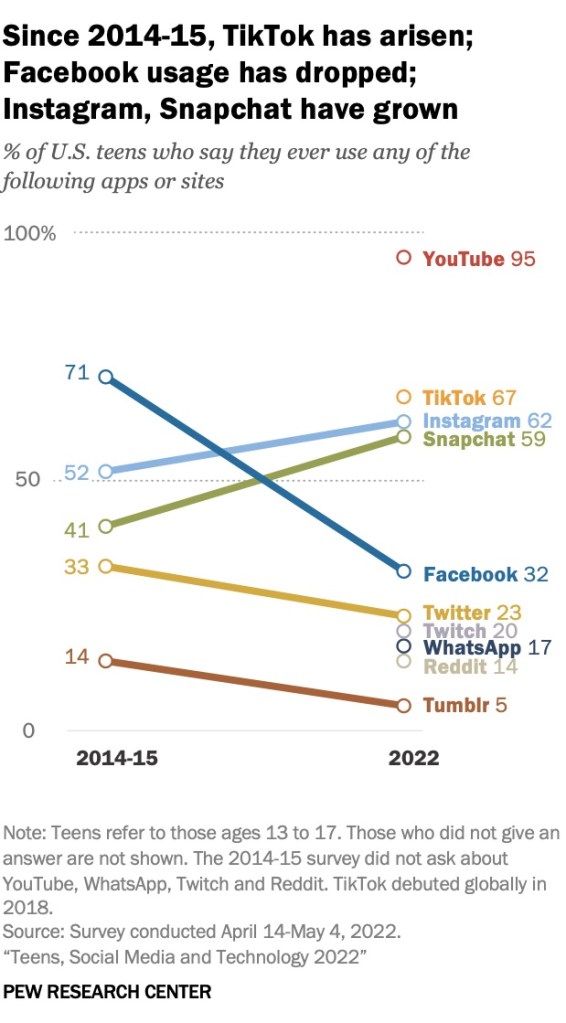
“There are now well over five strongly positioned social media platforms to endlessly scroll through, and it isn’t sustainable for our minds to compartmentalize nor prioritize our relationship with all of them,” Terpak said. “For the sake of time and sanity, people have to eliminate platforms that begin to lack a value-add incentive.”
Terpak thinks that Facebook, which teens often associate with their parents, has little to offer Gen Z.
“The culture cultivated by the average Facebook user is very disconnected from what attracts Gen Z to a platform today, instead exuding the energy of a spam email,” she said.
READ MORE: Teens have abandoned Facebook, Pew study says (TechCrunch)
Not only is there a smaller share of teenage Facebook users than there was in 2014-15, teens who do use Facebook are also relatively less frequent users of the platform compared with the other platforms covered in this survey. Just 7% of teen Facebook users say they are on the site or app almost constantly (representing 2% of all teens).
Although today’s teens do not use Facebook as extensively as teens in previous years, the platform still enjoys widespread usage among adults, as seen in other recent Center studies.
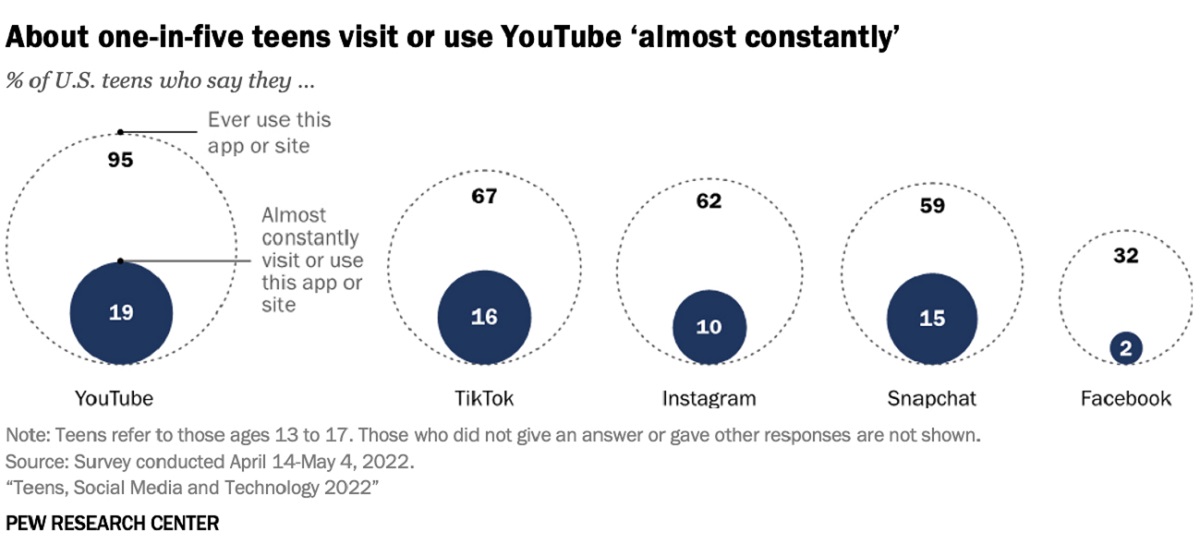
Pew’s new findings are also consistent with Facebook’s own internal reporting, according to documents leaked by whistleblower Frances Haugen. The Verge reports that a Facebook researcher found in early 2021 that teenage users on Facebook’s app had declined 13% since 2019 and projected that the figure would continue to plummet 45% over the next two years.
Meta missed its Q2 earnings and this drop-off in a key demographic is bad news for Facebook’s ads business, which makes up the bulk of its revenue.
READ MORE: Meta Q2 sales decline 1% to $28.82B, EPS drops 32%, moves CFO to new chief strategy officer role (TechCrunch)
“Most young adults perceive Facebook as a place for people in their 40s and 50s,” said the 2021 internal Facebook document obtained by The Verge. “Young adults perceive content as boring, misleading, and negative.”
READ MORE: Facebook’s Lost Generation (The Verge)
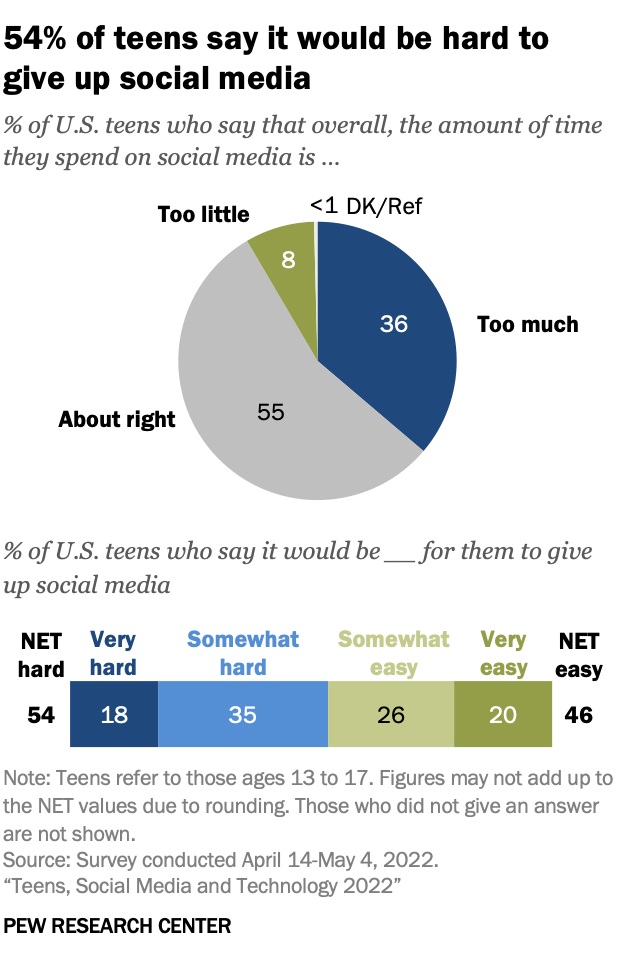
TikTok and Instagram
Other social media platforms have also seen decreases in usage among teens since 2014-15. Some 23% of teens now say they never use Twitter, compared with 33% in 2014-15. Tumblr has seen a similar decline. While 14% of teens in 2014-15 reported using Tumblr, just 5% of teens today say they use this platform.
The big winners are TikTok, YouTube and Instagram, another Meta platform. A growing number since 2014 are also using Snapchat. Sixty-two percent of teens use Instagram, up from 52% in the 2014-2015 survey. But TikTok, which wasn’t even released at the time of the last study, is now used by 67% of US teens.
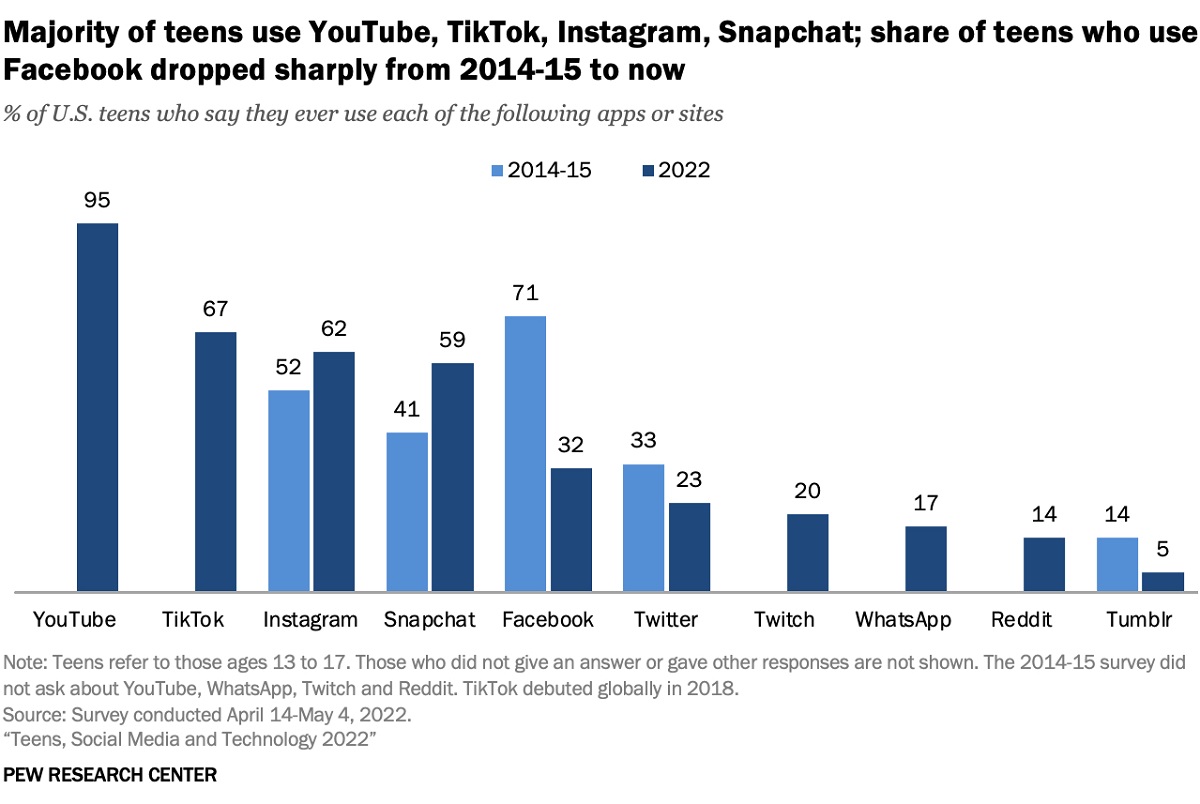
Ninety-five percent of teens say they use YouTube, which may make it seem like it’s the dominant social platform — but many users interact with the platform simply to watch videos, rather than as a place to connect with others online. For example, a teen who uses YouTube to listen to music would be included in that 95%.
There are some notable demographic differences in teens’ social media choices. For example, teen boys are more likely than teen girls to say they use YouTube, Twitch and Reddit, whereas teen girls are more likely than teen boys to use TikTok, Instagram and Snapchat. In addition, higher shares of Black and Hispanic teens report using TikTok, Instagram, Twitter and WhatsApp compared with white teens.
SOCIAL MEDIA, WEB3, AND HUMANITY’S DIGITAL FUTURE:
Technology and societal trends are changing the internet. Concerns over data privacy, misinformation and content moderation are happening in tandem with excitement about Web3 and blockchain possibilities. Learn more about the tech and trends driving humanity’s digital future with these hand-curated articles from the NAB Amplify archives:
- The TikTok-ing of Western Civilization
- Web3 and the Battle for the Soul of the Internet
- Our Collective (and Codependent) Relationship with Data
- Want to Fix Social Media? Stop Listening to the Bots and Algos
- Social Media Is a Disaster for Democracy, But Who’s Going to Change It?
Pew also asked the 1,316 surveyed teens about the frequency with which they use these apps. But TikTok still earned a greater share of teens’ attention than any platform aside from YouTube, which 19% of teens say they use “almost constantly.” TikTok, Instagram and Snapchat earned this “almost constant attention” from 16%, 10% and 15% of teens respectively. Only 2% said this about Facebook.
So is the habit ingrained? Yes, but not quite as baked in as you might think
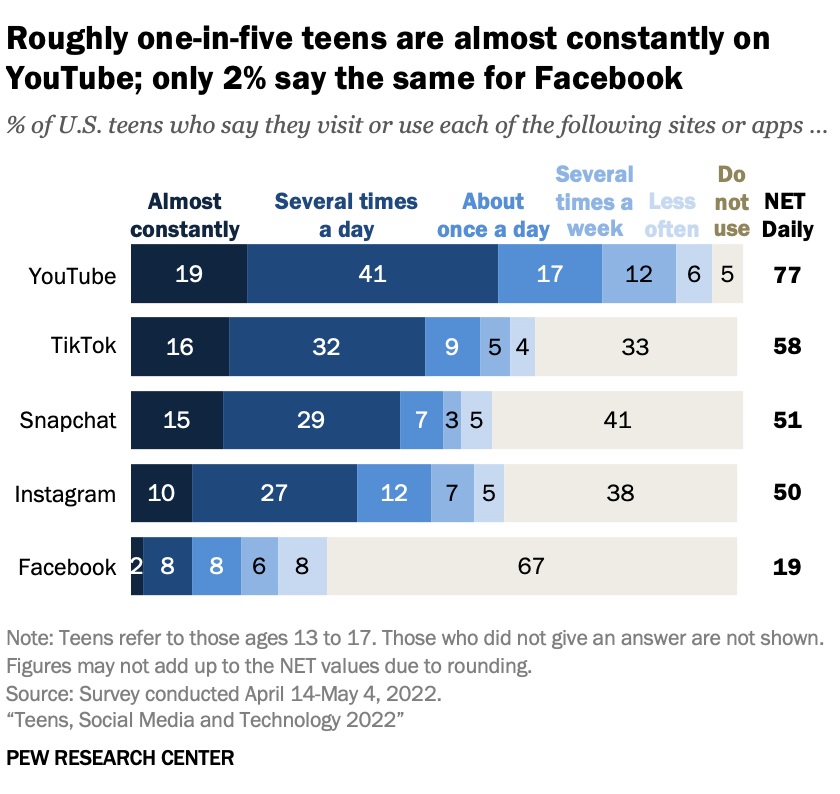
Asked about the idea of giving up social media, 54% of teens say it would be at least somewhat hard to give it up, while 46% say it would be at least somewhat easy. Teen girls are more likely than teen boys to express it would be difficult to give up social media (58% vs. 49%).
Conversely, a quarter of teen boys say giving up social media would be very easy, while 15% of teen girls say the same. Older teens also say they would have difficulty giving up social media. About six in 10 teens ages 15 to 17 (58%) say giving up social media would be at least somewhat difficult to do. A smaller share of 13- to 14-year-olds (48%) think this would be difficult.

